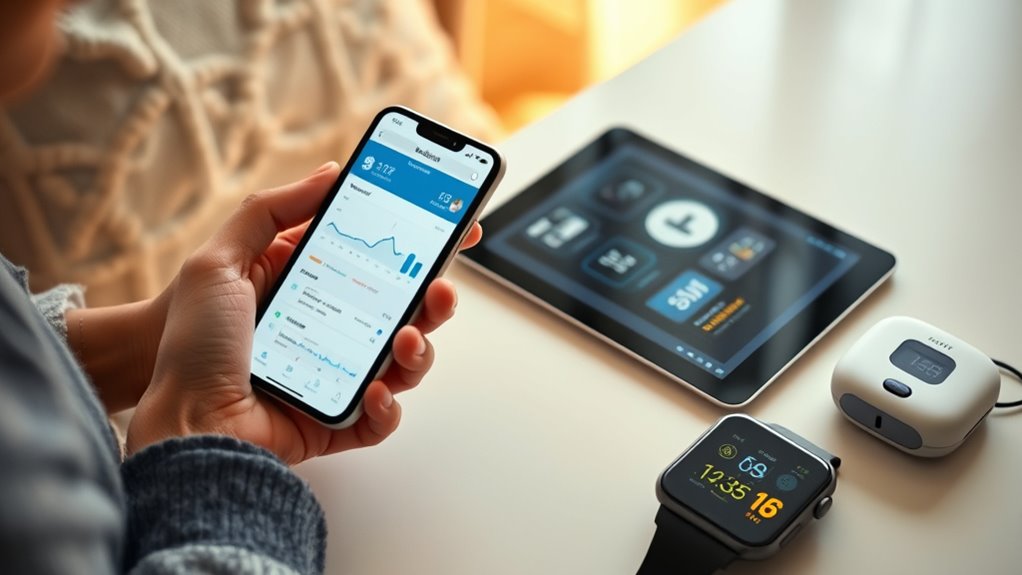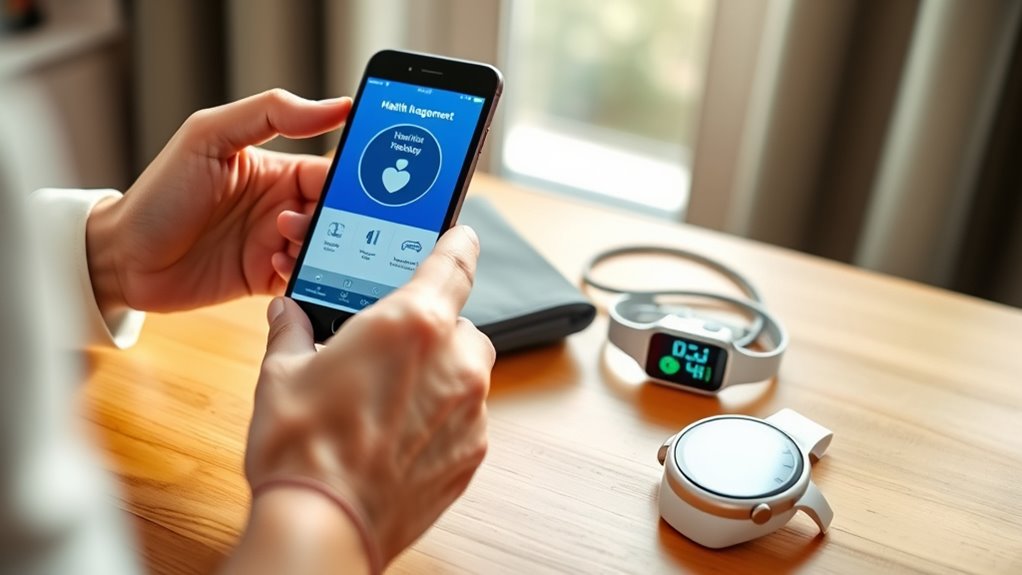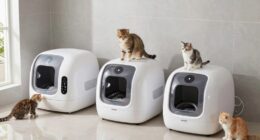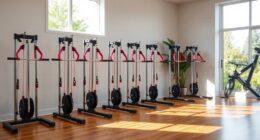Tech tools for caregivers, including apps and devices, make managing care easier and more effective. You can use remote monitoring devices like wearables and motion sensors to keep track of your loved ones’ health and safety in real-time. Medication management tools and smart dispensers help confirm they take the right doses on schedule. These innovations provide peace of mind and quick emergency responses—exploring more reveals how to pick the best options for your needs.
Key Takeaways
- Remote monitoring devices track vital signs, activity, and safety, providing real-time updates to caregivers from any location.
- Medication management tools simplify tracking prescriptions, send reminders, and facilitate communication with healthcare providers.
- Smart medication devices dispense medications accurately, include alerts, and prevent missed doses or overdoses.
- Apps integrating these tools enable caregivers to monitor health data, coordinate schedules, and respond quickly to emergencies.
- Technology enhances safety, organization, and proactive care, supporting caregivers in delivering better support and peace of mind.

Caring for a loved one can be challenging, but the right technology can make a significant difference. With the right tools, you can stay connected, monitor their well-being, and manage their care more efficiently. Two key areas where technology shines are remote monitoring and medication management. These tools not only give you peace of mind but also help guarantee your loved one’s safety and health.
Remote monitoring devices are a game-changer. They allow you to keep an eye on your loved one’s activities and vital signs without being physically present. For example, wearable devices can track heart rate, sleep patterns, and movement, alerting you if something seems off. Motion sensors placed around the home can detect falls or unusual inactivity, notifying you immediately if something requires attention. These tools empower you to respond quickly to emergencies or changes in your loved one’s condition, even if you’re miles away. Plus, many remote monitoring systems integrate with smartphones or computers, providing real-time updates and detailed reports. This way, you’re always in the loop and can make informed decisions about their care. Incorporating remote monitoring devices can also help you develop a better understanding of your loved one’s daily patterns and needs, fostering a more proactive approach to their health.
Remote monitoring devices provide real-time updates on loved ones’ activity and vital signs, ensuring safety from anywhere.
Medication management is another critical aspect where tech tools offer substantial support. Keeping track of medications can be overwhelming, especially if your loved one takes multiple prescriptions or has complex schedules. Medication management apps are designed to simplify this process. They send reminders when it’s time to take pills, refill prescriptions, or schedule doctor visits. Some apps even allow you to create detailed medication lists, including dosages and instructions, which can be shared with healthcare providers. Smart pill dispensers take this a step further by organizing medications and dispensing the correct dose at the right time. They often come with alerts and lock mechanisms to prevent missed doses or accidental overdoses. Using these tools reduces the risk of medication errors and assure your loved one stays on their prescribed regimen. Proper medication management is essential to prevent adverse interactions and ensure consistent treatment.
Both remote monitoring and medication management devices are user-friendly and customizable, fitting seamlessly into your daily routine. They provide a safety net, giving you reassurance that your loved one is safe and cared for. Technology isn’t a replacement for personal attention, but it acts as a powerful supplement, making caregiving more manageable. By leveraging these tools, you can respond more quickly to emergencies, stay organized, and ultimately improve your loved one’s quality of life. Whether you’re managing health issues from afar or overseeing daily routines, these innovations make a tangible difference in caregiving, giving you confidence and peace of mind every step of the way.
Frequently Asked Questions
Are These Apps Suitable for All Age Groups?
You wonder if these apps suit all age groups. While many are designed with user friendliness in mind, their age appropriateness varies. Younger users may find intuitive interfaces, but older adults might need extra guidance to navigate features comfortably. It’s important to evaluate each app’s design and features to make certain they match the user’s tech skills and needs. Always choose apps that are easy to use and tailored to the specific age group.
How Secure Is My Personal Health Data?
Your personal health data is protected more fiercely than a treasure chest guarded by dragons! Most apps use top-notch data encryption to keep your info safe and adhere to strict privacy policies. While no system is completely invincible, these measures make it highly unlikely for hackers to access your data. Always review privacy policies, update your app regularly, and choose trusted providers to guarantee your health information stays secure.
Can These Tools Be Used Offline?
You might wonder if these tools work offline. Many apps offer offline functionality, allowing you to access crucial information without an internet connection. However, keep in mind that data synchronization occurs once you’re back online, updating your records across devices. This means you can manage care tasks offline efficiently, but for real-time updates and backups, an internet connection is essential.
Do These Devices Require Technical Expertise?
You might wonder if these devices require technical expertise. Many are designed with user-friendly interfaces, making them easy to operate even if you’re not tech-savvy. Plus, most come with technical support availability, so help is just a call or message away if you encounter issues. This guarantees you can confidently use the tools to manage care without feeling overwhelmed or needing advanced skills.
Are There Costs Associated With Premium Features?
You might wonder if premium features come with extra costs. Many apps use different pricing models, including subscription costs or one-time payments. Some offer free versions with limited features, while others require a monthly or yearly fee for access to advanced tools. Always check the pricing details before committing, so you can choose the option that best fits your budget and care needs.
Conclusion
By leveraging these apps and devices, you can simplify your caregiving duties and stay organized. These tools help you monitor health, manage appointments, and stay connected with loved ones. But isn’t the ultimate goal to provide compassionate, attentive care without feeling overwhelmed? Embracing technology isn’t just about convenience; it’s about empowering you to be the best caregiver you can be. Are you ready to harness these tools and make a meaningful difference today?









